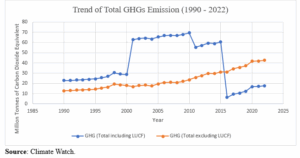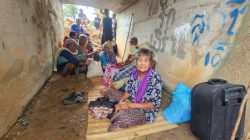Understanding Climate Change and the Role of the Paris Agreement
Climate change refers to long-term shifts in weather patterns, primarily driven by human activities such as pollution and deforestation. These actions release greenhouse gases (GHGs) into the atmosphere, which act like a blanket around the Earth, trapping heat and causing global warming. The effects of climate change are non-excludable, meaning they affect all nations regardless of their geographic location. However, developing countries often face the most severe consequences due to their limited adaptive capacity.
The Paris Agreement is a significant milestone in the global effort to combat climate change. As an internationally binding treaty under the United Nations Framework Convention on Climate Change (UNFCCC), it brings together countries in a collaborative effort to address climate change and adapt to its impacts. The agreement’s primary goal is to limit the rise in global average temperature to well below 2°C above pre-industrial levels, with efforts to keep it within 1.5°C.
Under the Paris Agreement, each country is required to submit its Nationally Determined Contributions (NDCs). These comprehensive national climate action plans outline specific commitments to reduce GHG emissions and enhance climate resilience. NDCs form the basis of each country’s contribution to the global climate effort, detailing the mitigation and adaptation strategies they intend to pursue.
Ghana’s Commitment to Reducing Emissions
Ghana amended its NDC in 2021, setting a target to reduce GHG emissions by 15% using domestic resources, amounting to 24.6 million tonnes of CO₂ (MtCO₂e). With international support, the country aims for an additional 30% reduction, totaling 39.4 MtCO₂e. This brings the overall emission reduction target to 64 MtCO₂e by 2030. To achieve these goals, Ghana intends to leverage carbon finance through the carbon market and engage the private sector actively.
The Emergence of Carbon Markets
Carbon markets have become essential tools in the global response to climate change. They offer a carbon pricing mechanism through which governments and non-state actors can trade GHG emission credits. Countries and corporations can offset their emissions by purchasing carbon credits, which represent emission reductions achieved through various climate mitigation projects. These projects can be nature-based, such as preventing deforestation or promoting carbon sequestration through cover cropping, or technology-based, such as clean cookstoves and electric vehicles.
Article 6 of the Paris Agreement enables countries to trade carbon credits for meeting emission reduction targets. A carbon credit equals one metric ton of carbon dioxide or the equivalent of other greenhouse gases that have been avoided, reduced, or sequestered. There are two types of carbon markets: compliance markets, also known as cap-and-trade or emission trading schemes, and voluntary carbon markets, also known as offsetting schemes.
Ghana’s Carbon Market Dynamics
Ghana is strategically leveraging Article 6 of the Paris Agreement by emphasizing cooperative approaches within the international carbon market. According to Ghana’s 2024 Annual Progress Report on Engagements in International Carbon Markets, the country has established bilateral cooperation with five nations: Switzerland, Sweden, Singapore, South Korea, and Liechtenstein.
Ghana’s framework supports both compliance and voluntary carbon markets, providing clarity on approval processes and the conditions under which mitigation outcomes can be authorized for international transfer. The Carbon Market Office (CMO), part of the Environmental Protection Agency’s (EPA) climate change unit, is the official national authority responsible for managing engagement in carbon markets related to climate change.
Authorization and Verification Processes
Ghana has implemented a structured authorization process for carbon market participation, including project registration, approval by relevant ministries, and issuance of Letters of Authorization (LoA) for Internationally Transferred Mitigation Outcomes (ITMO) transfers. These authorizations ensure alignment with Ghana’s NDCs and sustainable development goals.
The verification of carbon credits follows international standards, including independent third-party validation and verification processes. These ensure transparency, accuracy, and credibility in emissions reduction claims. Ghana is building national capacity to ensure effective monitoring, reporting, and verification (MRV) systems to support market integrity.
Ghana’s GHG Emissions Trends
Ghana officially joined the international carbon market in 2016. Total GHG emissions, including Land Use Change and Forestry (LUCF), experienced a notable decline immediately after 2015, dropping sharply from around 60 MtCO₂e to below 10 MtCO₂e by 2016, and remaining relatively low through 2022. In contrast, total GHG emissions excluding LUCF have shown a steady increase over the same period.
Although the timing indicates a potential connection between Ghana’s participation in the carbon market and the decrease in total greenhouse gas emissions, the significant drop is mainly attributed to shifts in land use and forestry emissions rather than emissions from other sectors. This distinction underscores the role LUCF plays in Ghana’s total emissions profile and highlights the potential impact of carbon market mechanisms and forest-based mitigation strategies.
Opportunities in the Carbon Market
Ghana’s active participation in international carbon markets presents unique opportunities to align climate action with sustainable economic growth. By leveraging carbon finance, the country can attract foreign investment, accelerate green development, and unlock substantial financial resources. Key areas where Ghana stands to benefit include increased Foreign Direct Investment (FDI), economic development, and climate finance to boost GDP.
Strategic Actions for Maximizing Benefits
To fully harness the economic and environmental opportunities presented by carbon markets, Ghana must go beyond policy commitments and establish a strong implementation framework. This involves creating an enabling environment that supports effective governance, active public participation, private sector investment, and sustainable project development.
Strategic actions include enhancing the efficiency of key institutions, educating the general public on carbon markets, providing government support to project developers, sensitizing end users, and promoting public-private finance partnerships. These steps will help Ghana position itself to maximize the benefits of carbon finance while advancing its climate and development goals.
Conclusion
Ghana stands at a pivotal moment in its climate policy trajectory, where strategic engagement in the global carbon market can unlock significant environmental, economic, and social benefits. Through its structured framework, international partnerships, and commitment to Article 6 of the Paris Agreement, Ghana has laid a solid foundation for leveraging carbon finance to meet its ambitious emission reduction targets.
To fully capitalize on these opportunities, targeted interventions are required. Strengthening institutional capacity, increasing public awareness, incentivizing private sector participation, and promoting inclusive public-private partnerships are essential. Aligning carbon market activities with national development goals ensures that climate action translates into tangible gains such as job creation, improved air quality, and rural development.
As the world intensifies its shift toward low-carbon development, Ghana’s proactive participation in the carbon market not only enhances its climate resilience but also positions it as a leader among developing countries in mobilizing innovative climate finance solutions. The challenge now lies in sustaining momentum, fostering transparency, and ensuring that the carbon market delivers equitable and lasting development outcomes for all Ghanaians.







